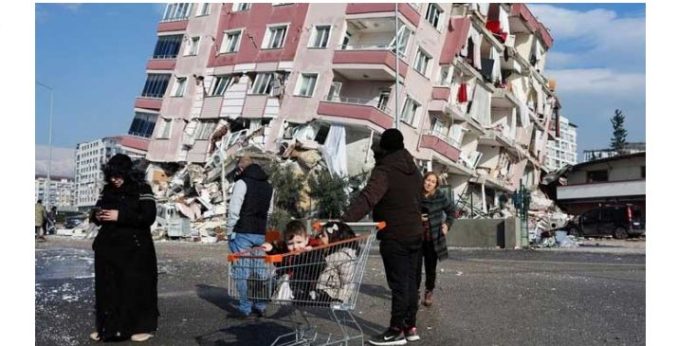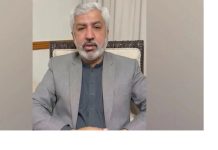ANTAKYA: Turkish President Tayyip Erdogan on Tuesday declared a state of emergency in 10 provinces devastated by two earthquakes that killed more than 5,200 people and left a trail of destruction across a wide area of southern Turkey and neighbouring Syria.
A day after the quakes hit, rescuers working in harsh conditions struggled to dig people out of the rubble of collapsed buildings.
As the scale of the disaster became ever more apparent, the death toll looked likely to rise considerably. One United Nations official said it was feared thousands of children may have been killed.
And residents in several damaged Turkish cities voiced anger and despair at what they said was a slow and inadequate response from the authorities to the deadliest earthquake to hit Turkey since 1999.
“There is not even a single person here. We are under the snow, without a home, without anything,” said Murat Alinak, whose home in Malatya had collapsed and whose relatives are missing. “What shall I do, where can I go?”
Monday’s magnitude 7.8 quake, followed hours later by a second one almost as powerful, toppled thousands of buildings including hospitals, schools and apartment blocks.
Tens of thousands of people were injured or left homeless in cities in Turkey and northern Syria.
Winter weather has hampered rescue and relief efforts and made the plight of the homeless even more miserable. Some areas were without fuel and electricity.
Aid officials voiced particular concern about the situation in Syria, already afflicted by a humanitarian crisis after nearly 12 years of civil war.
Erdogan on Tuesday declared the 10 Turkish provinces affected as a disaster zone and imposed a state of emergency there for three months. This will permit the government to bypass parliament in enacting new laws and to limit or suspend rights and freedoms.
The government will open up hotels in the tourism hub of Antalya to temporarily house people impacted by the quakes, said Erdogan, who faces a national election in three months’ time.
The death toll in Turkey had risen to 3,549 people, Erdogan said. In Syria, the toll was at least 1,712, according to the government and a rescue service in the insurgent-held northwest of the country.
‘Every minute, every hour’
Turkish authorities say some 13.5 million people were affected in an area spanning roughly 450 km (280 miles) from Adana in the west to Diyarbakir in the east, and 300 km from Malatya in the north to Hatay in the south.
Syrian authorities have reported deaths as far south as Hama, some 250 km (155 miles) from the epicentre.
“It’s now a race against time,” World Health Organization Director General Tedros Adhanom Ghebreyesus said in Geneva. “Every minute, every hour that passes, the chances of finding survivors alive diminishes.”
Across the region, rescuers toiled night and day as people waited in anguish by mounds of rubble clinging to the hope that friends, relatives and neighbours might be found alive
In Antakya, capital of Hatay province bordering Syria, rescue teams were thin on the ground and residents picked through debris themselves. People pleaded for helmets, hammers, iron rods and rope.
One woman, aged 54 and named Gulumser, was pulled alive from an eight-storey building 32 hours after the quake.
Another woman then shouted at the rescue workers: “My father was just behind that room she was in. Please save him.”
The workers explained they could not reach the room from the front and needed an excavator to remove the wall first.
Turkish authorities say more than 12,000 search and rescue personnel are working in the affected areas, along with 9,000 troops. Some 70 countries and sending personnel, equipment and aid.
But the sheer scale of the disaster is daunting.
“The area is enormous. I haven’t seen anything like this before,” said Johannes Gust, from Germany’s fire and rescue service, as he loaded equipment onto a truck at Turkey’s Adana airport.
Turkey’s Disaster and Emergency Management Authority (AFAD) said 5,775 buildings had been destroyed in the quake and that 20,426 people had been injured.
In Geneva, UNICEF spokesperson James Elder said: “The earthquakes…may have killed thousands of children.”
‘Terrifying scene’
Syrian refugees in northwest Syria and in Turkey were among the most vulnerable people affected, Elder said.
In the Syrian city of Hama, Abdallah al Dahan said funerals for several families were taking place on Tuesday.
“It’s a terrifying scene in every sense,” said Dahan, contacted by phone. “In my whole life I haven’t seen anything like this, despite everything that has happened to us.”
Mosques opened their doors to families whose homes were damaged.
Syrian state news agency SANA said at least 812 people were killed and 1,449 people injured in the government-held provinces of Aleppo, Latakia, Hama, Idlib and Tartous.
At least 900 people were killed in Syria’s opposition-held northwest and 2,300 injured with the toll expected to “rise dramatically”, the White Helmets rescue team said.
“There are lot of efforts by our teams, but they are unable to respond to the catastrophe and the large number of collapsed buildings,” group head Raed al-Saleh said.
Time was running out to save hundreds of families trapped under the rubble of buildings and urgent help is needed from international groups, he said.
A UN humanitarian official in Syria said fuel shortages and the harsh weather were creating obstacles.
“The infrastructure is damaged, the roads that we used to use for humanitarian work are damaged,” UN resident coordinator El-Mostafa Benlamlih told Reuters from Damascus.
‘Where is the state?’
At Turkey’s Iskenderun port, hundreds of shipping containers were ablaze, shutting down operations and forcing freight liners to divert vessels to other ports. The maritime authority said the fire was a result of earthquake damage.
In Turkey’s Malatya, where snow lay thick on the ground, people expressed their frustration at what they said was the lack of help as they searched for the missing.
With no specialist equipment or even gloves, they tried to pick through the wreckage of homes crumpled by the force of the earthquake.
“My in-laws’ grandchildren are there. We have been here for two days. We are devastated,” said Sabiha Alinak.
“Where is the state? We are begging them. Let us do it, we can rescue them. We can do it with our means.
















